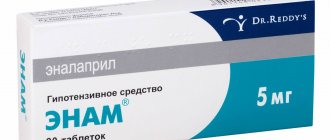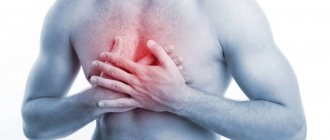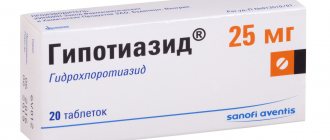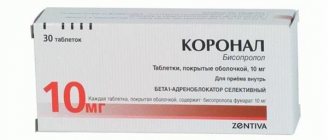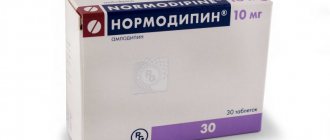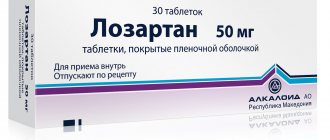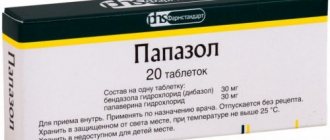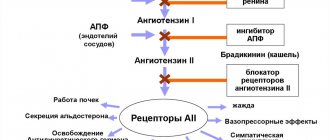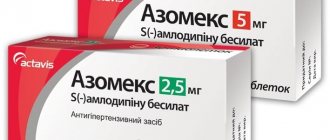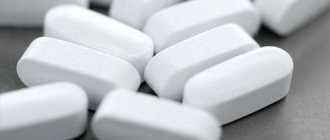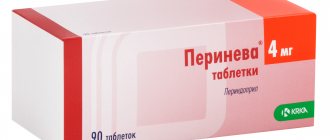Medicine information
The drug Reserpine is an indole alkaloid, an adrenergic blocker. It has pronounced hypotensive properties, which is why it helps well with blood pressure.
Release form and packaging
The drug Reserpine is presented in pharmacy chains in two forms of release:
- Pills;
- Injection.
The most popular for hypertension is the tablet form of the drug as it is safer, easier to dosage and use.
Sold in packages containing 50 tablets.
Reserpine is the main component of the combination drug Adelfan-Ezidrex
Composition of tablets
The main active ingredient of the drug is reserpine, presented in dosages of about 1 mg or 0.5 mg. The tablets also contain auxiliary ingredients: starch, magnesium stearate, silicon dioxide
Terms of sale and price
The cost of the drug is determined by the form of release, the dosage of the main active ingredient, the number of ampoules or tablets in the package. The average price for Reserpine varies from 99 rubles to 230 rubles. You can purchase the drug in pharmacy chains freely, without presenting a doctor's prescription.
Storage conditions
It is recommended to store the drug Reserpine in a shaded, cool place out of reach of children and animals. The maximum shelf life of tablets is 3 years.
Pharmacodynamic properties
Reserpine lowers blood pressure due to its effect on the sympathetic nervous system. The tablets normalize blood pressure (BP) by reducing the amount of the hormone norepinephrine.
The mechanism of action of the drug is due to its following pharmacological properties:
- Hypotensive effect;
- Sedative, sedative effect;
- Activation of glomerular filtration rate processes;
- Hypnotic effect;
- Antipyretic effect.
Reserpine at high blood pressure helps to weaken sympathetic innervation, which has a negative effect on blood vessels and the heart. In case of hypertension, you can not only reduce blood pressure with Reserpine, but also eliminate such unpleasant accompanying symptoms as rapid heartbeat, heart rhythm disturbances, psycho-emotional instability, and sleep disorders.
When used in high doses, the sympatholytic has an effect on the central nervous system similar to antipsychotic drugs.
Scheme of action of adrenergic blockers
Description
This medication was produced in tablet form, in two dosage variations - 0.1 and 0.25 mg.
There is also an injection solution with the same two dosage options. The drug became widely used in cardiology, but was abandoned over time. Some modern drugs offered for the treatment of hypertension also contain reserpine - for example, Cristoserpine. Reserpine is an indole alkaloid; it appears as a white or yellowish finely crystalline powder.
Its main pharmacological property is its sympatholytic effect. It affects the body, one might say, in many ways: the antihypertensive effect of this substance is associated with its effect on the peripheral nervous system, but the effect on the neurochemistry of central processes demonstrates its neuroleptic effectiveness. Once upon a time, reserpine was even used to treat mental illnesses.
The package contains 50 tablets; in addition to reserpine itself, standard form-building components were included in its formula. It was a prescription drug.
Pharmacokinetic characteristics
The active ingredients of Reserpine tablets are absorbed by the patient's body by approximately 40%. The bioavailability of the drug is about 60%.
The maximum concentration of active substances in the blood is observed 2.5 hours after taking the tablets.
The drug is excreted from the human body mainly through the gastrointestinal tract, together with feces (about 62%), and only 8% of the active substances are excreted through the renal apparatus.
Pharmacokinetics of the substance
The absorption of reserpine in tablets is 40%, its bioavailability is within 60%, and the volume of distribution is 9.1 l/kg. It binds to plasma proteins by approximately 96%.
The peak plasma concentration of the component after taking the medicine in tablet form will be achieved in a maximum of 180 minutes. The substance is able to cross the placental barrier. It is also found in breast milk if a nursing mother takes medications with this component.
The evacuation of the substance itself and its metabolites takes place in two stages: they are called alpha and beta phases. The elimination period is 4.5 hours and 271 hours according to the phases. 8% of the dose is evacuated through the kidneys within 4 days (mainly in the form of metabolites). 62% exits through the intestines (almost entirely as unchanged substance).
If a hypertensive patient drinking reserpine has renal failure, the slower excretion of the component by the paired organ is somewhat compensated by increased excretion in the bile. Therefore, there is no need to worry about component cumulation.
What is Reserpine prescribed for?
Medical experts recommend that patients take Reserpine for high blood pressure if the following clinical indications exist:
- Arterial hypertension;
- Mild heart failure;
- Rapid heart rate (tachycardia);
- Psychoses provoked by alcohol abuse;
- Hypersympathicotonia;
- Schizophrenia;
- Hypertonic disease;
- Vascular pathologies;
- Thyrotoxicosis (with the aim of reducing the heart rate and the manifestation of neurovegetative symptoms).
Reserpine for hypertension is prescribed both as an independent drug and as one of the components of complex therapy, in order to eliminate painful symptoms and prevent a number of complications characteristic of this disease.
Arterial hypertension is the main indication for prescribing the drug
Pharmacodynamics of the substance
The pharmacological group of Reserpine is sympatholytics. This, as already stated, means that its influence can be seen in relation to the sympathetic nervous system. The main effect of the component is to reduce the amount of norepinephrine and lower blood pressure.
The medicine has the following properties:
- Antipyretic;
- Hypotensive;
- Hypnotic;
- Sedative;
- Accelerating glomerular filtration rate.
Reserpine makes sympathetic innervation, which affects the heart and blood vessels, significantly weaker. A specific manifestation of this action is a decrease in heart rate, a decrease in peripheral vascular resistance, and a decrease in renin secretion. Reserpine has a depressant effect on the central nervous system: large doses work as an antipsychotic.
The component also stimulates the production of exocrine glands, and also activates gastrointestinal motility. The substance is characterized by a long latent period and a long duration of action.
What are the contraindications for taking
Reserpine tablets for blood pressure are not prescribed to patients with the following clinical contraindications:
- Heart failure of a congestive nature, occurring in severe form;
- Depressive states;
- Hypotonic disease (low blood pressure);
- Bradycardia (slow heartbeat);
- Severe form of cardiovascular pathologies;
- Individual intolerance and hypersensitivity to the components contained in the drug;
- Nephrosclerosis;
- Damage to cerebral blood vessels of an atherosclerotic nature;
- Ulcerative colitis, occurring in acute form;
- Bronchial asthma;
- Severe diseases of the renal apparatus;
- Ulcerative lesions of the gastrointestinal tract, during exacerbation;
- Electropulse therapy is planned for the near future.
It is strictly forbidden to use Reserpine to treat expectant mothers and women during breastfeeding!
How to take for arterial hypertension and hypertension
Instructions for use of Reserpine recommend using the tablet form of the drug to lower blood pressure at home. Medication injections are given only in a hospital or under the supervision of medical specialists!
If you have high blood pressure, you should drink Reserpine before meals on an empty stomach. It is important to swallow the capsules whole, without chewing or crushing them!
The starting dosage for blood pressure, hypertension, and arterial hypertension is 0.05 mg of the drug, 2-3 times a day. In the absence of adverse reactions, the daily dose is increased to 1 mg.
The duration of the therapeutic course is determined individually. To avoid withdrawal syndrome, it is recommended to stop taking the drug smoothly and gradually, reducing the daily dosage to 0.5, 0.2, and then 0.1 mg.
To achieve stable positive results, treatment with Reserpine tablets for hypertension must be carried out in courses, 2-3 times throughout the year.
It is recommended to take the medicine before meals
What negative reactions are possible?
The instructions for use of Reserpine also indicate cases of side effects. They can appear from different organs and systems.
Negative answer - options:
- Digestive profile. Epigastric pain, nausea and vomiting, loose stools, and ulceration of the gastrointestinal mucosa cannot be ruled out. If taken for a long time and in high doses, liver function may fail.
- Heart and blood vessels. The main reaction, which occurs infrequently, is bradycardia. There may be an arrhythmia. Taking in high doses in some cases can lead to increased angina symptoms.
- NS. Insomnia or drowsiness - such polar states are quite possible, they depend on the individual reaction. Weakness, fatigue, apathy and lethargy are possible. Severe anxiety, irritability, feelings of anger and panic may also appear. Depressive disorders are likely. Taking in high doses is dangerous due to nightmares, as well as parkinsonism.
- Leather. Skin itching - often, herpes - less often.
- Others. The mucous membranes tend to dry out and swell. The mucous membranes of the eyes can also become hyperemic. Rarely, shortness of breath, weight gain, changes in sexual desire and erectile problems occur. Anuria or dysuria cannot be excluded.
In case of overdose (if the recommended dose is exceeded), the main symptom will be increased side effects. It is imperative to call an ambulance; further treatment will be symptomatic.
Use for hypertensive crisis
The drug Reserpine is sometimes used as an emergency treatment for hypertensive crisis. This condition is fatal and requires medical intervention and hospitalization.
The dosage of tablets and the regimen for taking the drug during a hypertensive crisis are determined by the attending physician strictly on an individual basis. Having called the ambulance, before the doctors arrive, it is recommended to call the doctor, report your blood pressure readings and get advice on the use of Reserpine. In this way, it is possible to provide the patient with pre-medical care and avoid numerous adverse consequences.
In inpatient settings, the drug is administered to patients with hypertensive crisis, mainly intravenously, to achieve the fastest and most pronounced hypotensive effect.
Special instructions and recommendations
If you are planning a surgical procedure, you must inform the specialist who prescribed Reserpine. The drug should be discontinued no later than a few days before the date of the proposed operation.
Since Reserpine tablets affect the condition and functioning of the central nervous system, during the therapeutic course you should refrain from driving vehicles and other activities that require composure, coordination, speed of reactions and increased attention.
Patients with diagnosed diabetes mellitus before starting treatment with Reserpine should consult with a qualified specialist regarding the dosage and regimen of taking the tablets, since this drug reduces the effectiveness of medications, the action of which is aimed at lowering blood sugar levels.
During the course of treatment with Reserpine, it is better to stop driving a car.
Adverse reactions from taking the drug
Treatment of high blood pressure with Reserpine may cause the following side effects:
- Heart rhythm disturbances;
- Excessive decrease in blood pressure;
- Slow heartbeat (bradycardia);
- Skin itching;
- Sleep disorders (insomnia at night and drowsiness during the day);
- Nausea and vomiting;
- Painful sensations localized in the abdominal area;
- Anuria;
- Swelling of the mucous membranes:
- Erectile dysfunction in representatives of the stronger sex;
- Dyspnea;
- Increase in weight category;
- Increased fatigue, decreased ability to work;
- Lethargy, apathy, general malaise, depressed state;
- Psycho-emotional instability, causeless anxiety, irritability;
- Nightmares;
- Panic attacks.
If any adverse reactions occur, you should temporarily stop taking the drug and consult your doctor!
Drug interactions
Simultaneous use of Reserpine with non-steroidal anti-inflammatory drugs reduces its hypotensive effect.
Combination with furazolidone or procarbazine increases the likelihood of developing spontaneous hypertension.
It is strictly not recommended to consume alcoholic beverages and alcohol-containing drugs during treatment with Reserpine tablets, since such a combination has a suppressive effect on the central nervous system and provokes the development of severe depressive conditions.
Reserpine reduces the effectiveness of Levopoda when used simultaneously.
Taking the drug is incompatible with alcohol
Substitutes for Reserpine
The following analogues of Reserpine are presented on the modern pharmaceutical market:
- Serpat;
- Alserin;
- Christoserpine;
- Sedaraupin;
- Rausedil;
- Kwescin.
It is important that an analogue of the drug is selected by a qualified specialist, since all substitutes have their own characteristics in terms of dosage, contraindications and limitations.
Reserpine for high blood pressure is an effective drug that can improve the condition of a patient suffering from hypertension. The tablets have a number of contraindications and relative restrictions for use, so they should be taken strictly as prescribed by a specialist in the recommended dosage!
What to replace
Analogues of Reserpine, as noted above, are numerous. Based on this, you can replace the medicinal product with Alserin, Rausedil, Christoserpine, Kvescin, Sedaraupin, Serpat, etc. But the replacement will be made by a doctor. There can be no independent withdrawal of a drug in favor of another!
Reserpine price is actually an empty request. A specific medicine like this cannot be found in pharmacies today. You can find its analogues. For example, Raunatin costs about 110 rubles for 50 tablets.
Today Reserpine is not the most relevant medicine. It is indeed prescribed, but only if the component is part of a certain therapeutic combination. The most common combination is reserpine + hydrochlorothiazide + dihydralazine.
